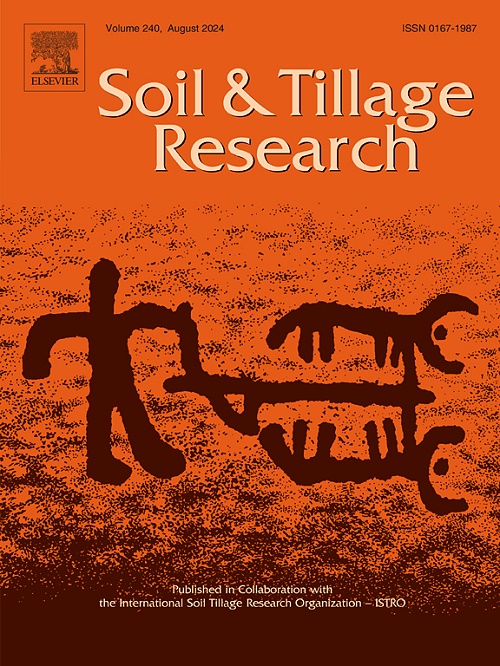Challenges and potential pathways towards sustainable agriculture crop production: A systematic review to achieve sustainable development goals (SDGs)
IF 6.1
1区 农林科学
Q1 SOIL SCIENCE
引用次数: 0
Abstract
Food insecurity will pose a grave global concern due to biodiversity imbalances, ecosystem degradation, and threats to human survival. However, implementing enhanced practices to address issues like droughts, floods, advancements in fertilizer and pesticide use technology and soil management can increase food production, thereby improving food security. As the global population rises, ensuring food security through sustainable agriculture practices has become imperative to achieve sustainable development goals (SDGs). This research endeavours to add to the discourse surrounding the obstacles and possibilities in shifting towards sustainable agriculture globally, exploring the roles of SDGs and traditional farming practices. This systematic review (SR) examines the challenges faced by contemporary agricultural systems and soil management in achieving sustainability, with a focus on crop production. We reviewed scientific peer-reviewed literature and global data to reflect the vision of agriculture sustainability and sustainable soil management to achieve food security, focusing on policy intervention and probable pathways for different sectors to reach their objectives, the challenges related to sustainable pathways, and possible approaches to attaining climatic hazard and improving agricultural efficiency. The review identifies and evaluates potential pathways and innovations that offer promising solutions for transitioning toward sustainable agriculture. These pathways include agroecological approaches, sustainable intensification, precision farming technologies, integrated pest management, conservation agriculture (CA), soil management, and sustainable water management practices. Furthermore, the study emphasizes the importance of policy interventions, stakeholder engagement, and knowledge dissemination in fostering the adoption of sustainable practices across diverse agricultural landscapes. This SR aims to provide a nuanced understanding of the multifaceted challenges agricultural systems face. It offers a comprehensive overview of viable pathways for achieving sustainable crop production. The findings underscore the urgent need for a holistic and integrated approach that aligns with the SDGs, fostering resilience, environmental stewardship, and equitable development within the global agricultural sector.
可持续农业作物生产的挑战和潜在途径:实现可持续发展目标的系统回顾
由于生物多样性失衡、生态系统退化和对人类生存的威胁,粮食不安全将引起严重的全球关注。然而,实施强化做法来解决干旱、洪水、化肥和农药使用技术以及土壤管理方面的进步等问题,可以增加粮食产量,从而改善粮食安全。随着全球人口的增长,通过可持续农业实践确保粮食安全已成为实现可持续发展目标的必要条件。本研究旨在围绕全球向可持续农业转变的障碍和可能性展开讨论,探讨可持续发展目标和传统农业实践的作用。本系统综述(SR)探讨了当代农业系统和土壤管理在实现可持续性方面面临的挑战,重点是作物生产。我们回顾了同行评议的科学文献和全球数据,以反映农业可持续性和可持续土壤管理实现粮食安全的愿景,重点关注不同部门实现其目标的政策干预和可能途径,可持续途径相关的挑战,以及应对气候灾害和提高农业效率的可能方法。该报告确定并评估了为向可持续农业过渡提供有希望的解决方案的潜在途径和创新。这些途径包括农业生态方法、可持续集约化、精准农业技术、病虫害综合治理、保护性农业(CA)、土壤管理和可持续水管理做法。此外,该研究还强调了政策干预、利益相关者参与和知识传播在促进在不同农业景观中采用可持续实践方面的重要性。本报告旨在对农业系统面临的多方面挑战提供细致入微的理解。它全面概述了实现可持续作物生产的可行途径。研究结果强调,迫切需要采取符合可持续发展目标的全面综合方法,在全球农业部门内加强抵御力、环境管理和公平发展。
本文章由计算机程序翻译,如有差异,请以英文原文为准。
求助全文
约1分钟内获得全文
求助全文
来源期刊

Soil & Tillage Research
农林科学-土壤科学
CiteScore
13.00
自引率
6.20%
发文量
266
审稿时长
5 months
期刊介绍:
Soil & Tillage Research examines the physical, chemical and biological changes in the soil caused by tillage and field traffic. Manuscripts will be considered on aspects of soil science, physics, technology, mechanization and applied engineering for a sustainable balance among productivity, environmental quality and profitability. The following are examples of suitable topics within the scope of the journal of Soil and Tillage Research:
The agricultural and biosystems engineering associated with tillage (including no-tillage, reduced-tillage and direct drilling), irrigation and drainage, crops and crop rotations, fertilization, rehabilitation of mine spoils and processes used to modify soils. Soil change effects on establishment and yield of crops, growth of plants and roots, structure and erosion of soil, cycling of carbon and nutrients, greenhouse gas emissions, leaching, runoff and other processes that affect environmental quality. Characterization or modeling of tillage and field traffic responses, soil, climate, or topographic effects, soil deformation processes, tillage tools, traction devices, energy requirements, economics, surface and subsurface water quality effects, tillage effects on weed, pest and disease control, and their interactions.
 求助内容:
求助内容: 应助结果提醒方式:
应助结果提醒方式:


